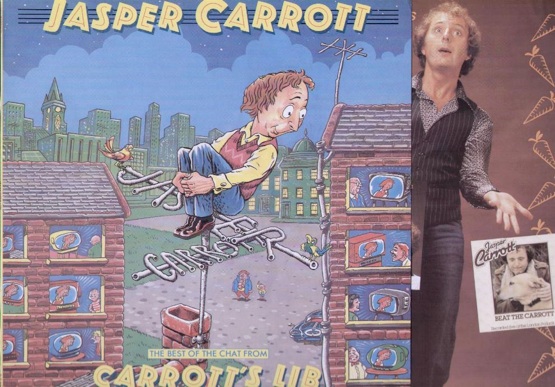‘We were actually making money. Not vast amounts, but good enough. We could pay the rent, eat, drink and smoke. I even managed to buy my first car: a thoroughly unsuitable white Escort estate. From where we’d been that was pretty damned rich. And we were doing what we loved. Life doesn’t get a whole lot better than that. But in our mind, career-wise, we were still on the launch pad. Our burning ambition was to get our own sitcom on Television. Everything we’d been doing so far was ground work for the main event. We were training for the big one.’
They had just finished work on the second season of Three of a Kind. ‘It’s an odd thing, working on a show, and you haven’t ever met the cast or the production crew, or even been to a recording. We had a better commission this time, and we sent down quite a bit of stuff. We started putting “Rob & Doug” on the heading, rather than our full names, basically because I got bored typing “By Rob Grant and Doug Naylor”. Then I got bored with “Rob & Doug”, and started varying it every time. “Rib & Dib”, “Flib & Flob” and so on, getting more outlandish all the time. We didn’t get a lot of feedback from the production office, and I started to panic that they didn’t know who the sketches were from.
‘We went down to the recording of the last show, because there was a wrap party afterwards. We were sitting in the audience seats towards the end of rehearsals, and Tracey Ullman yelled out ‘Hey look, it’s Blib and Blob!’ in an excited voice. I’ve no idea how she recognized us, but I think the quirky names had drawn attention to our sketches.’
The cast and crew and a few of the writers wound up going for a Chinese meal in Queensway, London, memorable for another reason: ‘Tracey had some sweetcorn and chicken soup that was particularly glutinous and globby. She dribbled it from her spoon and said: “Look: it’s like bloody smegma.” I had no idea what smegma was at the time. It was an inspirational moment.’
Three of a Kind’s whirlwind producer, Paul Jackson took Rob and Doug to one side to sound out their interest in working on a writing team for a live, Saturday night show, fronted by “one of the country’s top stand up comedians”.
‘He wouldn’t say the name. Apparently, Dave Allen had pulled out of a project because his involvement had been leaked prematurely to the press, and Paul wanted to play this one close to his chest.
‘Were we interested? It was a dream come true. We were aware of Saturday Night Live, which was a massive hit in the States, although we’d never actually seen it. We’d been give a book of the scripts by Pete Everett, who’d produced the American Way of Laughs, and the prospect of working on a UK version was thrilling.’
If it came off, it would mean moving to London. ‘We’d been leaning in the direction of moving down for a wee while. We were happy in Manchester in terms of the radio opportunities, but there was very little exciting TV being made up there. The one interesting show, at the time, was the Oxford Road Show (the BBC Manchester studios were located on Oxford Road), but, inexplicably, it was created and presented by London talent, including a very young Ben Elton.
‘We thought it very strange that they’d exported London writers to work on the only weekly comedy show out of Manchester, without even talking to us. It seemed to be barmy decision-making not to exploit local talent. It’s not like they weren’t making any comedy shows in London. A few months later there was another sketch show recorded in the Oxford Road studios, to which we weren’t invited to contribute. It was called Revolting Women, and only women were allowed on board.’
Except for an actor, Philip Bird, who featured as the feckless butt of the jokes. And the director, Geoff Posner. And, interestingly enough, a writer called Kim Fuller, who got through by mistake, because he had a girlie name.
Rob and Doug spent many hours trying to narrow down the possible headline name. ‘We didn’t think it would be one of the new ‘alternative’ lot. They weren’t seen as big time TV draws by the suits in broadcasting. Unless it was a double bluff, it wasn’t Dave Allen. We just couldn’t come up with a name who fit the bill.’
Then Paul called them. It was Jasper Carrott.
‘We didn’t really know a lot about him,’ Rob recalls, ‘He was sort of most famous for an inexplicable hit record, Funky Moped. It was actually the B side of the real hit Magic Roundabout which was never played on the BBC or radio channels due to excessive raunchiness, I think. I never heard it. We’d seen odd appearances on TV, and he was funny enough, though he did often have a guitar with him, which gave him a kind of folky image. Hmm.’
Still, it was an unmissable opportunity. It was enough to prompt them to make the move to London.
‘We loaded everything into Doug’s car. I mean, absolutely everything we owned. It wasn’t a big car, and it wasn’t exactly full. And we drove down to London. We hadn’t even got a flat to move into. We were planning to stay with friends until we snagged a place. We drove straight to a pre-production meeting for the show. We were about 5 minutes late. Paul read us the riot act. The defence that we’d just upped sticks and moved our entire life a couple of hundred miles didn’t wash with him. 5 minutes late!’
The show was to be called Carrott’s Lib.
‘I hated the title. Loathed it. It was already desperately out of fashion. But Jasper had fallen for it. It had a personal resonance for him. We were stuck with it.
‘There was a bunch of writers there we’d already met a few times. Kim Fuller had been the head writer on Three of a Kind; we knew Tony Sarchet, Andrea Solomons and Bob Sinfield from various BBC parties. We liked them all a lot. And there was an elegant, slightly older guy there. Neil Shand. We’d seen his name on the credits of dozens of shows. In particular, Spike Milligan’s legendary Q8 series. Instant respect. He was sort of the Head Writer, but his main brief was to work on Jasper’s monologues with the man himself.’
Paul had assembled a fairly eclectic cast to support Jasper.
‘Mark Arden and Steve Frost were two alternative sketch comics. They were very deadpan, low key and mad. There was Nick Wilton. We’d never met him, but he’d won the Perrier Award, I think, for a sketch show called Writers Inc. And Kay Stonham, who was an actress. As far as I could ascertain, she had no comedy pedigree, particularly. This was the kind of thing Paul used to do. He’d jam together people he thought were talented, and step back and see what happened.’
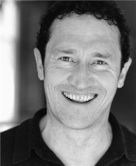
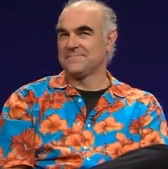
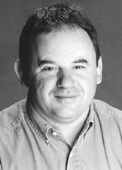
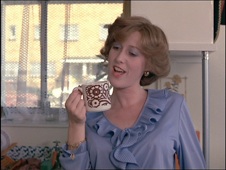
Mark Arden Steve Frost Nick Wilton Kay Stonham
Rik Mayall was also slated to appear.
‘That seemed like a very odd fit indeed. It turned out Rik was just doing his own, self-contained slot. He’d done a similar kind of thing on A Kick Up the Eighties, playing a character called Kevin Turvey. This time, his idea was to do Dave – The Cardboard Box. This involved a shot of an immobile cardboard box, to which Rik would add a voiceover. Hmmm.’
‘I liked Jasper immediately,’ Rob remembers. ‘He was smart and open to suggestions that took him outside of his comfort zone. It was a very brave challenge to take on: performing a series of completely untested routines in front of millions on live TV every Saturday night, backed by a cast of live TV virgins. He was taking all kinds of risks with his career.’
The show was to be directed by Geoff Posner. ‘We never mentioned Revolting Women to him, and he never mentioned it to us, so we got along brilliantly. Geoff was a “can do” director, still is, probably. Later on in our careers we’d come to realise that most directors aren’t like that: everything’s impossible, or far too difficult. I don’t recall ever throwing anything at Geoff that he even blinked at, much less hurled into the waste bin in a hissy fit. There were sketches he enjoyed more than others, of course: he had a particular fondness for parody, and he was very, very good at it.
‘Thinking back now, directing an hour long multi-camera live TV sketch show must have been a terrifying prospect. You’d never have known it from Geoff’s demeanour.’
‘We came away from the meeting charged up. We saw this as a huge opportunity to make our mark. We didn’t have a whole lot of spare time to find somewhere to live. We wound up fairly quickly in an apartment in Chiswick, which was a reasonable drive away from Television Centre. It was a pretty decent place, but it was costing an arm and a leg. We thought we’d find a more reasonable alternative after the agreement expired. If we were still solvent.












